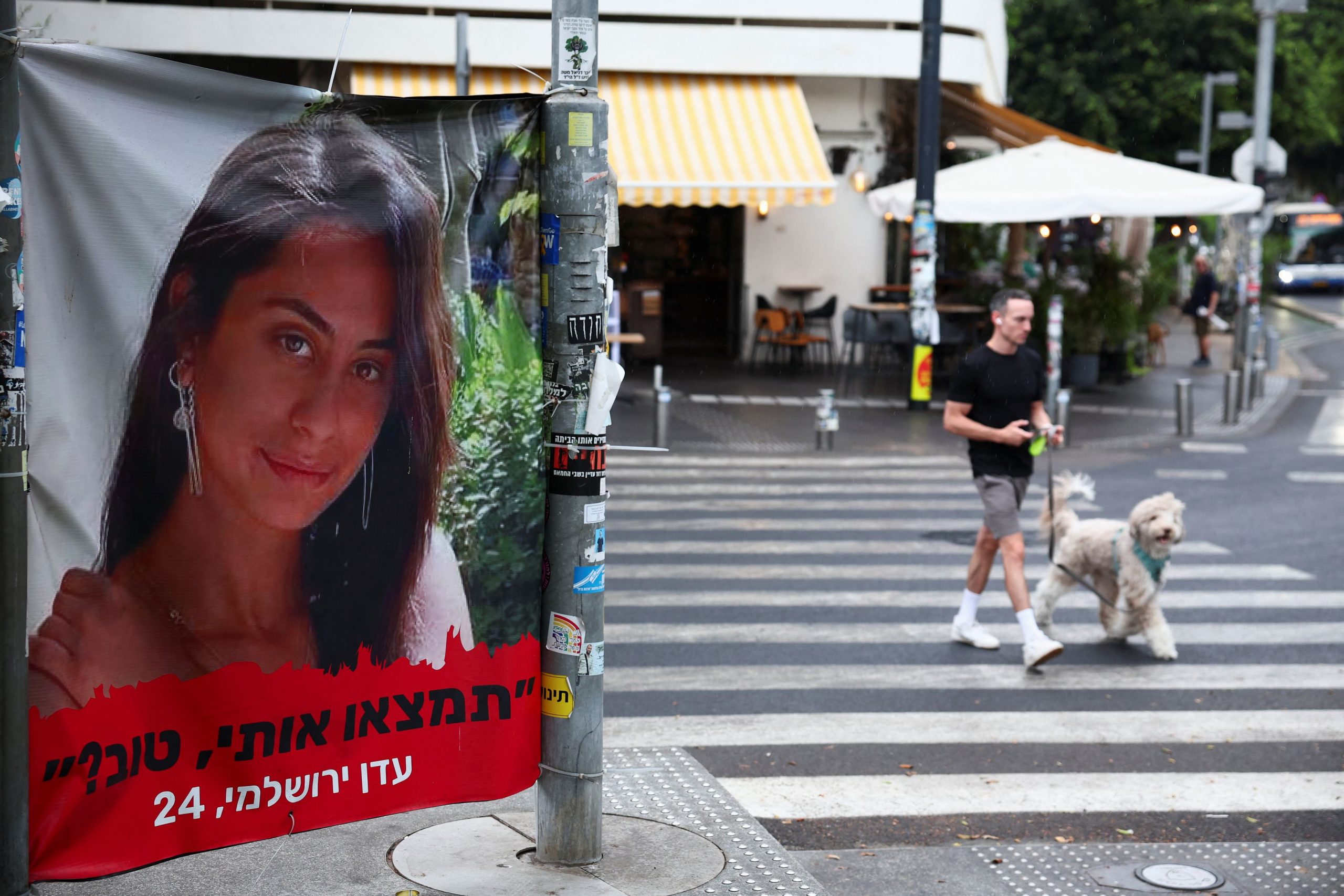TEL AVIV—The Israeli military retrieved six more dead bodies of hostages from Gaza on Saturday, including American-Israeli Hersh Goldberg-Polin, whose family had waged an almost 11-month battle to campaign for a cease-fire deal that would bring him and more than 100 other hostages home.
The announcement came early Sunday as concerns continue to grow about the dwindling number of living hostages in the enclave after nearly 11 months of war.
Israel said on Sunday that the bodies of two women and four men were recovered in an operation in southern Gaza. The military named the hostages as Hersh Goldberg-Polin, 23, Eden Yerushalmi, 24, Carmel Gat, 40, Almog Sarusi, 27, Alexander Lobanov, 32, and Master Sgt. Ori Danino, 25. All six were previously thought to be alive.
Israeli military spokesman Daniel Hagari said the bodies of the six hostages were discovered in a Rafah tunnel less than a mile from where Israeli troops found Qaid Farhan Al-Qadi, an Israeli hostage rescued alive by Israeli troops inside a tunnel Tuesday.
Hagari said the military didn’t have precise knowledge of the location of the six hostages and it isn’t clear how their fate is connected to Al-Qadi, who told family and friends his guards had abandoned him before he was found by Israeli troops.
“They were cruelly murdered by Hamas just a short time before we got to them,” Hagari said of the six dead hostages.
“I am devastated and outraged,” President Biden said in a statement on the death of Goldberg-Polin. “Make no mistake, Hamas leaders will pay for these crimes. And we will keep working around the clock for a deal to secure the release of the remaining hostages.”
Biden also praised Goldberg-Polin’s parents, Jon and Rachel, for fighting a “courageous” battle to free their son . Most recently, the couple spoke at the Democratic National Convention, calling for a cease-fire that would bring all the hostages home and end the suffering of Palestinians in Gaza.
Goldberg-Polin, who was kidnapped from the Nova music festival in southern Israel on Oct. 7, was seen alive in a video released by Hamas in late April. His forearm had been blown off in the attack.
“What’s hard for all of the families is we feel that there is not a sense of urgency in terms of the negotiators,” Rachel Goldberg-Polin told The Wall Street Journal last month. “I don’t know that my son will live another week.”
The discovery of more dead bodies in Gaza adds to the pressure on Israeli Prime Minister Benjamin Netanyahu to conclude a deal to bring those alive home. Israel has retrieved at least 12 bodies of hostages in the past two weeks alone, raising concerns about the fate of the remaining 97 hostages in Gaza taken in the attack, including many confirmed dead by Israel. Most Israeli officials insist that the only way to get all the remaining living hostages back is through a deal but cease-fire and hostage talks between Israel and Hamas are at a stalemate.
The Journal previously reported that the number of living hostages could be as low as 50, according to mediators in the hostage talks and a U.S. official familiar with the latest U.S. intelligence. The latest operation risks lowering this assessment even further. The hostages face risks including lack of food, untreated wounds, ill treatment by captors, and the danger of Israeli airstrikes, which lowers their chances of survival over time.
The announcement of more dead hostages is seen by supporters of a cease-fire deal as a sign that those captured have run out of time.
Shortly after the military’s statement on Sunday, the Hostages Families Forum, a group that represents most of the hostages, said the hostages could have been saved. The hostages “kidnapped alive on October 7th, were later murdered while in captivity. They could have been reunited with their families if a deal had been reached earlier.”
Israel recovered the bodies of six male hostages from a tunnel inside Gaza in late August, all whom were taken alive on Oct. 7. Some of the men appeared in hostage videos released by Hamas in previous months and were seen in the tunnels by released hostages who spoke to the Journal.
Hamas had previously offered to release some of the elderly men whose bodies were recovered in late August along with the bodies of two children and one woman to extend a cease-fire last year. Israel refused the offer and insisted on first freeing all of the living civilian women it believed to be held by Hamas, according to a former Israeli negotiator who was involved in the effort.
Write to Anat Peled at anat.peled@wsj.com and Dov Lieber at dov.lieber@wsj.com



